Pokémon’s Ash wins World Championship after 25 years – here’s why the franchise is still capturing fans
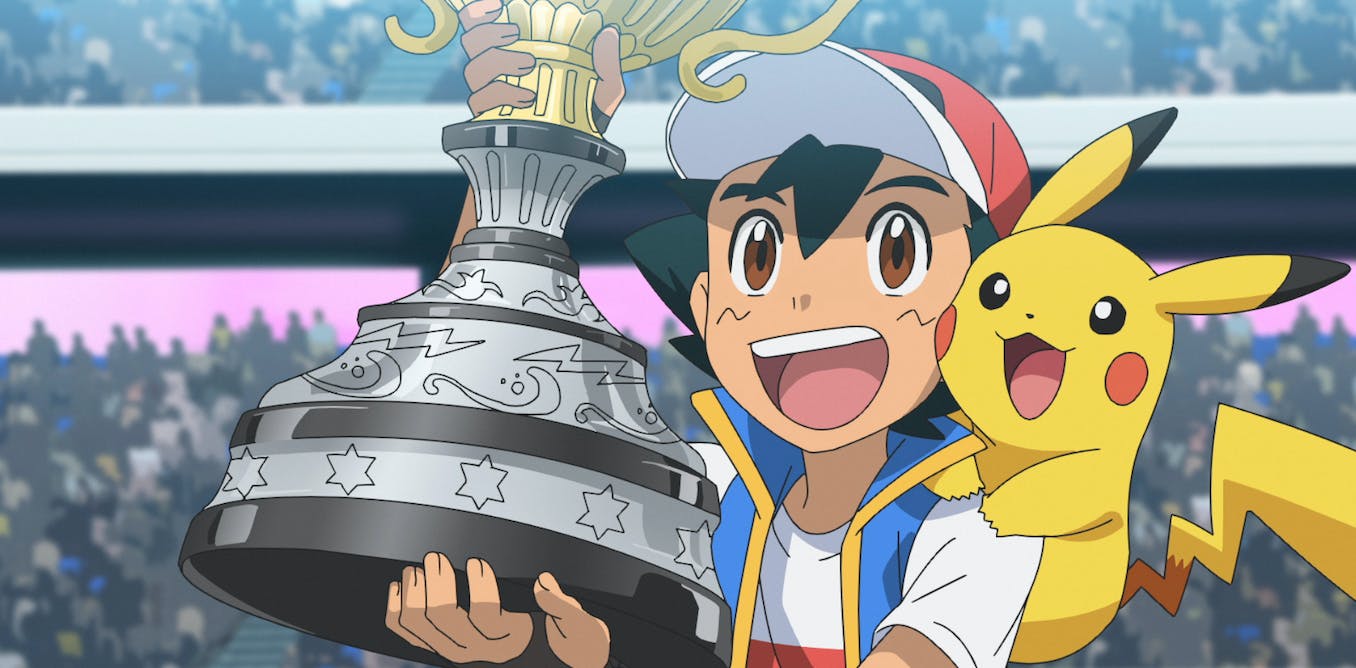
Ash Ketchum and Pikachu with the World Championship trophy The Pokémon Company
Twenty-five years ago, an animated ten-year-old boy was united with Pikachu, his very first “pocket monster” and set an ambitious goal: to become “the very best, like no one ever was” by winning the Pokémon World Championships.
On November 11, over 200,000 Twitter users joined in congratulating Ash on his victory. But now that Ash has achieved his goal, where does that leave the future of the Pokémon franchise?
Pokémon’s potential as a world-dominating franchise wasn’t immediately apparent in the early years of its development. The designer of the original Game Boy Pokémon games, Satoshi Tajiri, had more local goals at first. He had observed the stress that children in Japan seemed to be experiencing in the 1990s due to an “academic record society” that prized hard study and achievement over play and imagination.
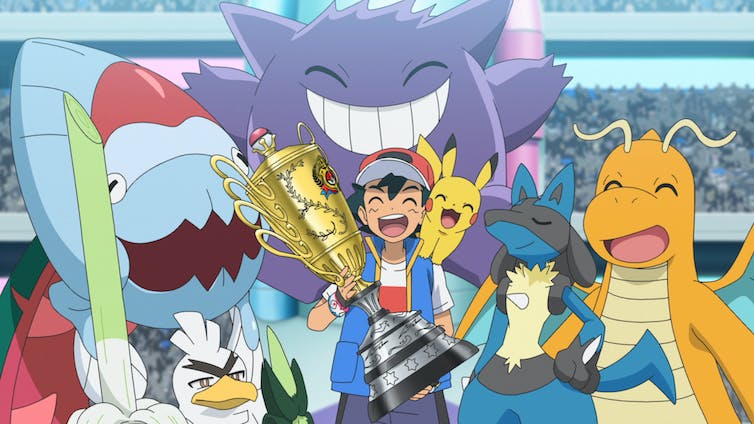
Ash Ketchum and his World Championship winning team of Pokémon, from the Ultimate Journeys Animation.
The Pokémon Company
The original game design drew from Tajiri’s memories of growing up in the 1960s, using his imagination to create his own entertainment, and drawing from such common childhood activities as bug catching.
Pikachu’s name is often attributed to the Japanese word pika, which was used to describe the flash of atomic weapons detonating. Early Pokémon culture was rooted in memories of post-war Japan, in contrast to the dominant trend at the time which removed Japanese associations from products destined for overseas consumption to make them “culturally odourless”.
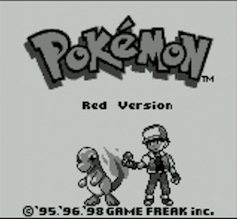
The title screen for the original Pokémon game, Pokémon Red.
The Pokémon Company
Despite these obstacles, Pokémon captured the global imagination. It became such a success that journalists and academics wrote of a “Pokémon craze” sweeping the media landscape of the 1990s. By 2004 however, scholars writing in Pikachu’s Global Adventure described “the spectacular, complex, and unpredictable rise and fall of Pokémon in countries around the world” as they predicted the end of the franchise’s peak popularity. As you might have noticed, however, Pokémon didn’t go anywhere.
Pokémon’s evolutions
Pokémon’s ability to incorporate new developments in audience engagement has been key to its success. In its early franchising into animated television, film, and merchandise, the Pokémon phenomenon is a prime example of the “media mix” or “media ecology” in which one story or character appears across a range of different media and entertainment products.
Pokémon proved highly adaptable across new platforms appearing in the 2010s and 2020s, with the development of Pokémon Go and Twitch channels dedicated to Pokémon trading. You can even watch a fish play Pokémon.
The Pokémon storyline fits neatly into many of these newer ways of engaging with the franchise. A simple narrative involving the collection and training of various “pocket monsters” to compete at major tournaments nicely mirrors the “completionism” trend that researchers have observed in many gaming communities.
Fan groups similarly often collect, organise, and archive objects of their fandom, as in the Twitch stream Twitch Plays Pokémon, where viewers control and play the franchise’s first incarnation, Pokémon Red, and fans independently document the stream’s history and records.
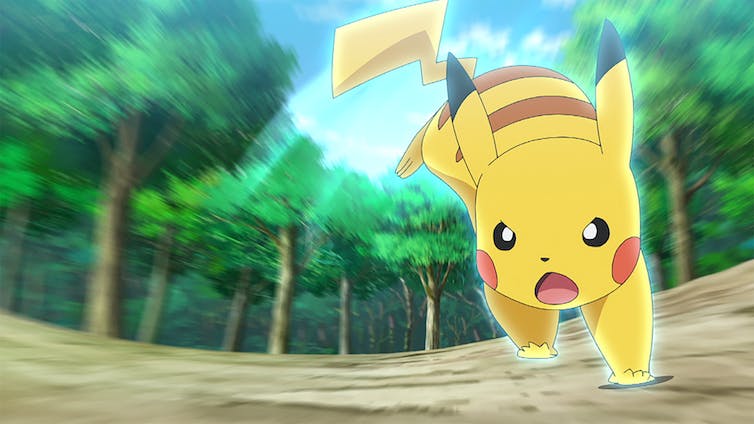
Pikachu is a fan favourite character across the franchise.
The Pokémon Company
Pokémon’s character aesthetics and motivations also continue to appeal to gamers and viewers alike. Ash’s 25-year quest has been interpreted by some UK fans as a message to “keep trying”, while each tournament win has been marked by fans noting the time invested in Ash’s improvement.
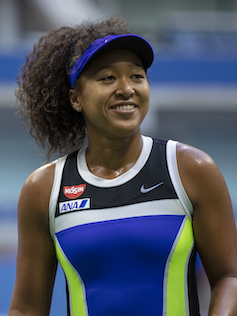
Tennis star Naomi Osaka is a self-declared Pokémon fan.
Andrew Henkelman, CC BY-NC-SA
As subsequent generations move on from the “academic record society” observed by Tajiri to our present-day understanding of the value of rest and mental health, Pokémon references even appear in the speeches of world-famous tennis pros. Naomi Osaka won fans outside the traditional tennis community in 2016 when a journalist asked her what her career goal was. She replied: “To be the very best, like no one ever was.”
Osaka later clarified the joke for the uncomprehending press and since has been regularly asked Pokémon-related questions in interviews. Relating herself to the Pokémon Snorlax, Osaka expressed her love of sleeping, while emphasising her explosive strength and power, like the character when he wakes up.
Growing the Pokédex
The range of character types included in the franchise, from the energetic Pikachu to the slow and sleepy Snorlax, suggests that there is something for everyone to relate to, from the millennial striver to the laid-back gen Z.
Digital streaming platforms like Netflix make Japanese popular culture more accessible and actively generate suggestions for content that we might like to watch, meaning a broader range of anime and franchised content is now available to global viewers. Rather than creating competition for Pokémon stories, the ability to “nostalgia-watch” 25-year-old episodes while also engaging with newer titles appears increasingly popular.
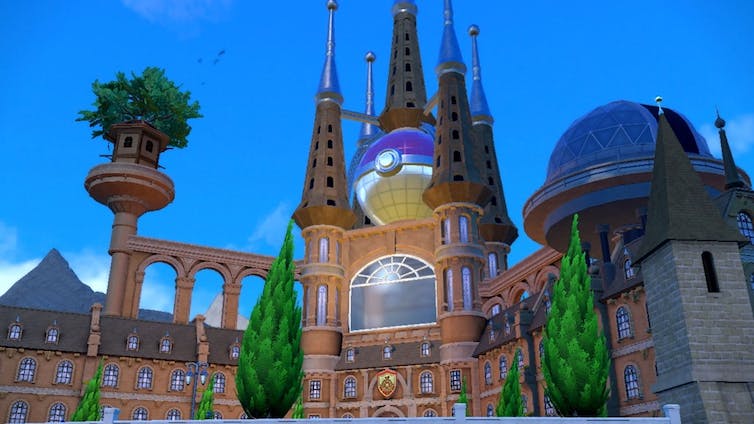
New game, Pokémon Scarlet Violet begins in a school.
The Pokémon Company
It is unclear whether Ash’s adventures will continue past his ultimate win. Rumours circulating in fan communities include speculation that Ash could return as a teacher or mentor to new characters. This could be in the school which features at the start of the upcoming Pokemon Scarlet and Violet, in a nice mirroring of Tajiri’s original inspiration to provide entertainment for stressed schoolchildren.
While we watch to see what Ash, or a new would-be Pokémon master, does next, the saturation of the franchise in our global everyday lives ensures that we won’t be short of Pokémon content any time soon.
![]()
Jennifer Coates does not work for, consult, own shares in or receive funding from any company or organisation that would benefit from this article, and has disclosed no relevant affiliations beyond their academic appointment.




